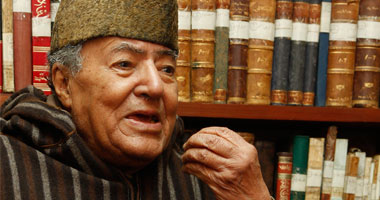Within the Ibn-Rashid Saloon, the Cairo Center for Human Rights Studies organized a symposium titled “Why Did the Islamic Nation Fail in the Modern Age?” Among those who participated were the Islamic thinker Gamal El-Banna and the Islamic history teacher in Ain-Shams University, Dr. Mahmoud Ismail. The symposium was run by Bahei-El-Din Hassan, the manager of the Cairo Center for Human Rights Studies. This meeting came within the efforts to assure the refusal of the Cairo Center for Human Rights Studies of all forms of legal bonds on freedom of opinion, expression and belief and its disapproval of all forms of expropriation. It was also part of the center offering the practical sample of the way opinions and ideas should be dealt with, through conversation and not expropriation. This is because on of the members of the Islamic Research Center in Al-Azhar recommended the confiscation of the book “The Responsibility for the Failure of the Islamic Nation in the Modern Age” by the Islamic thinker Gamal El-Banna and preventing it from being printed or published, in spite of the fact that it was first printed ten years ago.
The book contained two ideas that aroused the rancor of the Azharic religious institution. The first was concerned with allowing Muslim women to wear a hat instead of a veil in western societies to prevent harm. He based his argument on the fact that the aim of a veil is to keep Muslim women from harm, the situation changed, however, since harm is more likely to happen due to a Muslim woman wearing a veil in a western society. Al-Banna’s argument is summarized in allowing Muslim women to wear a hat since it provides the needed decorum and prevents any harm at the same time. The other issue is summarized in allowing “pleasure marriage”, where a man marries a woman for a certain agreed time and then gets divorced, to Muslim men living for a period of time in a western society. There is no difference, in El-Banna’s opinion, between pleasure marriage and traditional legal marriage except that it is marriage for a specific period of time. The reason to allow it is that it was allowed for a period of time at the beginning of Islam, then there was a Hadtih banning it, but it continued during Abo-Bakr Al-Sedik’s reign, and he did not prohibit it. Khalifa Amr-Ibn-Al-Khattab, however, came to ban it, which meant that the issue needs to be studied. Al-Banna then goes to the allowance from the point that a Muslim in a western society is allowed to adulterate according to social laws, and that marriage to a non-Muslim woman will result in, if there is a divorce, the woman taking half his money, which causes a lot of trouble to Muslims abroad. With these two topics, in spite of annoying the religious institution and the recommendation of confiscating the book, the book raised an important question of “Why did the Islamic State fail in the Modern Age?” that had to be raised and discussed. This is what Bahei-El-Din Hassan, the manager of the Cairo Center for Human Rights Studies, raised, since the question the symposium is concerned with raises a number of other questions, the first of which may be whether the Islamic state has really failed. Two possible answers were given to that question since there are some who say, through many Arab media, that there is a Muslim awakening and a revival of the Muslim world, but without doing the effort of showing the Arab and Muslim people any proof of the truth of what they say. Others, however, say the exact opposite. They say that there is an extreme failure in the Islamic world recently, which is proved by the latest speech of the Secretary General of the Islamic Conference, since his speech was almost a “sympathy speech” about the Muslim world. On another side, Bahei-El-Din Hassan pointed to the decline in the religious conversation prominent in Arab Muslim societies, pointing to the recent “fatwa” by Sheikh Kardawy at the journalists’ union and in public concerning allowing the killing of American civilians in Iraq!
Bahei-El-Din Hassan expressed his surprise at the Azhar’s decision to confiscate the book, while its men did not take the time to review the scholarly basis that Islamic groups lean on.
Bahei-El-Din Hassan also assured the Cairo Center’s defense of freedom of opinion and expression without bias towards a certain thinker’s work, since it is a rights organization.
Form his side, the Islamic thinker Gamal-El-Banna pointed to the fact that the Islamic trials to raise a religious state in Algeria, Sudan, Afghanistan and Pakistan have all failed, and that the trials in Iran and Saudi Arabia are two problems which have trials and cannot be considered a good example. Al-Banna clarified that the adherence to raising a Muslim state is due to the wrong interpretation of the verse “And I have created jin and men but to worship”. The people who hold the idea of raising an Islamic state that the only aim of Islam is worship, and have therefore reduced Islam in the aim of worship, therefore making the Islamic state a goal to try to achieve so that all people would worship Allah, which is an unimaginable thing. The state, according to Al-Banna, is a tool of submission and authority, and therefore when a state is created on religious values, whether Muslim or Christian, or moral values such as socialism and justice and equality, it would corrupt these values. This is because once authority, with its prisons and armies and police, comes into doctrine, it ruins it. He proved this by talking about the corruption of doctrine once authority comes into the picture, since the Islamic “Khelafa”, turned into a contemptuous monarchy since M’away’s reign in year 40 of the Hijra until the failure of the “Khelafa” in 1944.
The Hadtih about the “Medina State” is, according to Al-Banna, concerned with the exception and not the rule, in addition to the fact that the creation of this state was not on the basis of doctrine, but came as a natural development required by religious circumstances when the Korayshites conspired against the Prophet and was therefore the immigration to Medina. The Medina should not also be taken as an example since it did not have taxes, and there is no country in the modern age that does not demand taxes. This state, therefore, cannot be taken as a standard. More importantly, this state was headed by a Prophet receiving the Wahy, and none of those calling for an Islamic state have that quality.
The reasons vary for the failure of the trails at an Islamic state. The most important of these reasons, according to Gamal Al-Banna, may be the lack of freedoms in all these trials since the lack of freedom may be the common factor of all these experiences. This is in addition to another factor, which is concerned with these trials not maintaining the minimum level of human dignity in their societies without discrimination between men and women or white and black. Another reason concerning the failure of the Islamic state in its different trials is overlooking the most important job of a state which is development.
From another side, Al-Banna discussed the idea of the necessity of the Islamic state for spreading the message of Islam or to apply the Islamic Shari’a. He discredited this argument on which many Islamic currents lean, assuring that it is not necessary to have an Islamic state to apply the Shari’a, since the Shari’a can be applied if there is only an Islamic country which can follow the methods allowed by the civil constitutions of law-making.
From his side, Dr. Mahmoud Ismail, the founder of the Encyclopedia of the Sociology of Islamic Thought, expressed his appreciation of the Islamic thinker Gamal Al-Banna, assuring his important renewal role, especially that it comes in an age of weakness that has stretched from the sixth Hijri century until now, which explains the reasons for the confiscation and violating his right to express himself, disavowing the confiscation attitude which has become the religious institution’s method in dealing with those seeking renewal.
Dr. Mahmoud Ismail pointed out that the disagreement between scholars is not new, since it has been present strongly in the ages of the thriving of the Islamic culture. He said that the disagreements that were between well-known scholars (Malek, Ibn-Hanifa, Al-Sahf’y and Ahmed Bin-Hanbal) were not due to a difference in mental capabilities or intellectual directions of these scholars, but that they were due to each of them caring about the social and historical circumstances at the time. Ismail also clarified that, concerning the idea of an Islamic state, Islam did not specify any principles for that except the principal of counsellorship without any mention of the way the reign should be, and if this principle was truthfully applied without using religion for political authorative causes, solutions can be reached for many of our problems in a way that would please the majority. He pointed that the Shari’a in itself is unimportant, but has its importance in its aims, because a law has no value unless it fulfills the aims for which it was laid. He assured that Al-Banna did not go out in his work of the aims of the Shari’a, but tried to fulfill these aims and reach solutions to the new situations Muslims are in.
Concerning the saying that the Medina state is no longer an example of the religious state that some people want to create, he points out that the Medina state is not an example except in one field, which is legislation. This is because legislation was a reaction and contribution with the social and historical updates and situations and was always aiming at finding solutions for these situations. Ismail also pointed out that the basic references for political thought in the history of Islam were not from the Qur’an, but were from books and resources of Sultan reign such as Al-Mawardy. Some of these books laid the basis for what a correct Muslim ruler should be right, and a majority of these books actually justified the rulers’ injustice to the people, and gave them tricks and thoughts to hide their corruption and injustice and continue their reign. This is supported by the authority scholars who add the Shari’a to what is against the aims of the Shari’a with their intellectual games if that was in the interest of a severe sultan, even if he were a foreigner with no relationship to Islam, such as was the case with the scholars of the Turks and Mamluks. In return, the Islamic political though knew the perfect utopian image of the holy cities for Al-Faraby or Ibn-Rashid, but success in getting close to reality was not written for this group due to the alliance between intellectuals and ruthless or military rulers who used religion as a curtain to hide their ruthlessness.
The question now is, if the dark intellectuals aided the unjust ruler in his authority over the people and supported his reign, why do the intellectuals of the religious institution today insist on violating the rights of the people in expressing their thoughts and opinions, and why do they stand up to the trials of those who seek renewal in solving the changing problems of Muslims by changing their society?
Share this Post


